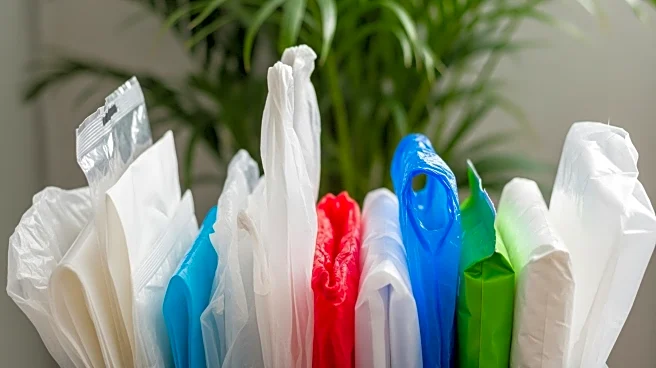What is the story about?
What's Happening?
Australia is set to replace its failed REDcycle program with a new industry-led soft plastics recycling scheme. The Soft Plastics Stewardship Australia (SPSA) aims to manage approximately 300,000 tonnes of soft plastics annually, which have been ending up in landfills. The scheme involves major supermarkets and manufacturers, including Woolworths, Coles, Aldi, Nestlé, Mars, and McCormick Foods. The SPSA plans to fund the collection, sorting, and processing of soft plastics through levies on manufacturers and retailers. However, the scheme is voluntary, and environmental groups have raised concerns about its effectiveness and potential cost shifts to consumers.
Why It's Important?
The introduction of the SPSA scheme is crucial as Australia struggles to meet its national packaging targets, which aim for 70% of plastic packaging to be recycled by 2025. The scheme's success could significantly impact the country's ability to manage plastic waste and reduce landfill contributions. However, the voluntary nature of the scheme and the potential for costs to be passed onto consumers could hinder its effectiveness. The initiative also highlights the broader global challenge of managing plastic waste and the need for sustainable recycling solutions.
What's Next?
The Australian Competition and Consumer Commission (ACCC) is expected to make a final decision on the scheme's approval in October. The SPSA plans to expand its board and appoint an advisory council for independent oversight. The scheme's initial levy will be $160 per tonne of packaging, increasing to $200 per tonne by mid-2026, with annual reviews. The SPSA aims to gradually increase the amount of soft plastics collected and processed, but the scheme's voluntary nature and limited initial capacity may pose challenges.
Beyond the Headlines
The scheme's voluntary nature raises concerns about accountability and the risk of 'greenwashing.' Environmental groups have requested mandatory reporting requirements to ensure transparency. The initiative also underscores the need for global cooperation in addressing plastic pollution and the importance of finding ways to reuse recycled materials effectively.
















